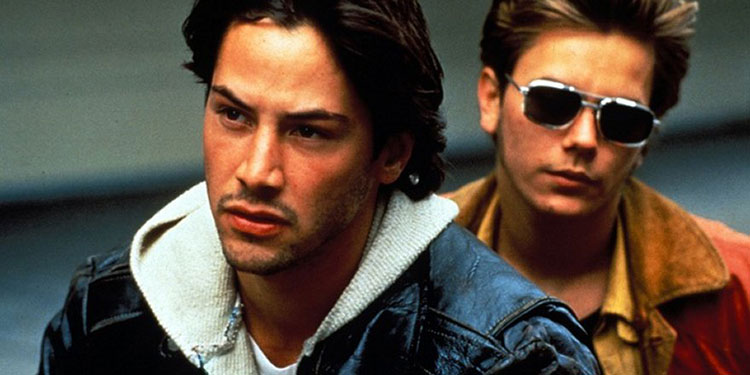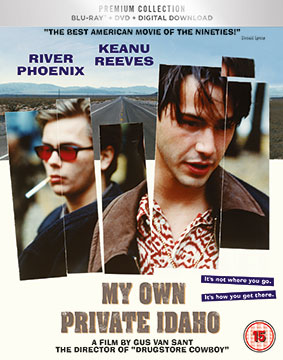
Director: Gus Van Sant
Running Time: 104 mins
Certificate: 15
Release Date: April 9th 2018 (UK)

My Own Private Idaho is the sort of film that really shouldn’t work. The movie apparently came about when writer/director Gus Van Sant was working on three separate scripts and then decided to merge them all together. The result is a movie that ought to be a mess. The tone and story jump about, some of its pretty random and surreal, and its Shakespearean pretentions are a bit bizarre.
However, it works. These disparate elements and tones come together, helped by an astonishing performance by River Phoenix as young hustler Mike. His character – an outsider living a marginal and disintegrating existence – is a reflection of the film itself. It ultimately becomes an unexpected masterclass of montage – where by placing seemingly disparate things side-by-side and throwing in unexpected imagery (not least the famous falling barn), it creates something unique and pulls you into a character and world in a way few other films have ever managed.
Mike is living on the streets of Portland, Oregon, turning tricks. He lives on the edge of society, suffering from narcolepsy and feeling abandoned. He meets Scotty (Keanu Reeves), who is also having sex with men for money, even though he’s the wayward son of the mayor. His life on the streets is an act of rebellion. They become friends and eventually head off on a road trip in a bid to find Mike’s mother who walked out on him when he was young.
While that the basic structure, it is both more complex and more wandering than that, most notably the way it mixes the grandiose and portentous with the prosaic and kitsch. The whole subplot involving Scotty and street mentor Bob Pigeon (William Richert) is based around Falstaff and Prince Hal in Shakespeare’s Henry IV Parts 1&II, complete with Shakespearean style dialogue. However, that’s all mixed in with images of kitsch Americana, dilapidated buildings and the base economics of sex. It is a strange and jarring mixture of the high and the low, which is also seen in its queering of religious imagery.
It throws in ideas about the broken American Dream, the lure of the Old World and whispers of religious allegory that never quite seem to coalesce. It is Phoenix who pulls that all together, making Mike an immensely empathetic figure – someone who deserves more but whose position in life makes it unlikely he’ll ever get it. He also ensures the movie in less problematic on an LGBT front than it would otherwise be.
Although presumably not intentional, much of the movie presents queer sexuality as purely sexual and based around economics and exploitation. Hustlers talk about how they’ve been abused and raped, and men sell themselves purely to survive while being taken advantage of by older men. The only one having sex with men by choice, Scotty, isn’t doing it because of any sense of desire, but as an act of rebellion. It is not a pretty picture of gayness.
However, Mike upends that with a sensitivity and desire that’s more nuanced and sympathetic. His love for Scotty is both sweet and sad, bringing an emotional connection to the film’s view of sexuality that’s lacking elsewhere. Mike may turn tricks for cash but also because he’s looking for something he doesn’t know how to find – a sense of connection, stability and normalcy. Between Van Sant and Phoenix, a queer aesthetic is shot through the entire film, although it is Phoenix who should perhaps get the most credit for this. He’s the one who wrote the famed campfire scene, which is the key to how the movie ultimately looks at sexuality and which colours how we see Mike’s actions both before and afterwards.
It is now a movie for everyone though. Ever since it was released it’s divided audiences between those who are pulled in to its underworld and those who think it’s a pretentious mess. However, LGBT viewers have tended to be the ones who ‘got it’, as while few live as marginal an existence as Mike, the whole movie is a testament to the spirit of outsiders and those who mainstream society wasn’t designed for. It’s something most queer people can relate to.
This new edition includes the film on Blu-ray, DVD and as a download/stream. The HD transfer looks surprisingly good, bringing out the muted vibrancy of the movie, which uses bold, flat colours in an interesting way. Previous transfers have often been soft and grainy, but that’s addressed here with a sharp picture that’s shows every subtlety of Phoenix’s commanding performance. Sadly though, there are absolutely no special features whatsoever, which feels like a real missed opportunity. It’s not like there are no features, as the US Criterion edition had plenty, but sadly we don’t get them in the UK.
Overall Verdict: Nearly 30 years after it was made, My Own Private Idaho remains a strange and unique film, but thanks to Gus van Sant’s ability to find the connection is disparate elements and River Phoenix’s incredible performances, it deserves its place as a queer classic.
Reviewer: Tim Isaac
Leave a Reply (if comment does not appear immediately, it may have been held for moderation)